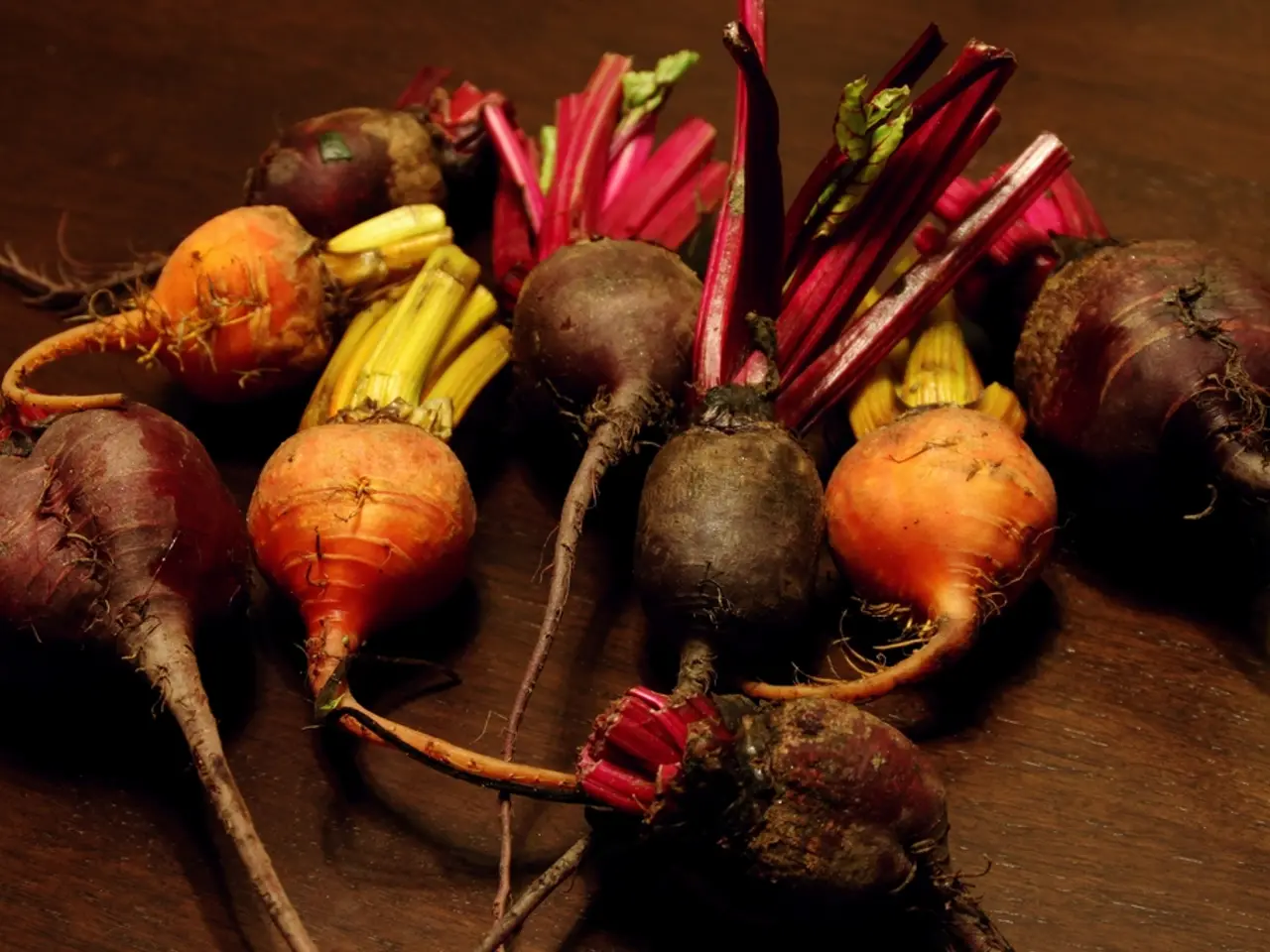Beet Juice: Nutritional Content, Health Advantages, and Usage Methods
Beetroot juice, known for its vibrant colour and earthy flavour, has gained popularity in recent years due to its potential health benefits. However, the recommended daily intake and notable side effects vary depending on individual health status and intended benefits.
For those with diabetes or those consuming beetroot juice for general health, the recommended daily intake can range from 2 ounces (60 ml) for Type 1 diabetes to up to 4 ounces (120 ml) for Type 2 diabetes. It is beneficial to divide the daily amount into smaller servings throughout the day to reduce potential blood sugar spikes. Those with gestational diabetes are advised to limit their intake to 2 ounces (60 ml) daily with medical approval [1].
For athletes seeking to enhance their performance, acute ingestion of 310–525 mg of dietary nitrates, approximately equivalent to 2 shots of concentrated beetroot juice, is recommended, to be consumed 60–90 minutes before exercise for peak nitrate availability [3].
Common side effects of beetroot juice consumption include passing red or pink urine or stool, known as beeturia, caused by the pigment betanin. This is harmless and temporary [2][3][4]. Drinking too much beetroot juice without adequate hydration can cause gastrointestinal discomfort or nausea for some individuals [2][4].
Beetroot juice can also lower blood pressure, so those on blood pressure medication should consult a healthcare provider before regular consumption [2][5]. Due to its natural sugar content, beetroot juice may affect blood sugar levels, so monitoring is advised, especially for diabetics [1][5].
A 2021 review suggests that beetroot juice may have potential effects on cancer, including stopping tumour cell growth, inhibiting angiogenesis, triggering cell death, and promoting autophagy. However, it is important to note that these effects are based on test tube and animal studies, not human studies [6].
When it comes to making beetroot juice at home, a juicer, blender, or food processor can be used. People should trim the tops off the beets, wash them thoroughly, and chop them into small pieces before juicing or blending. To avoid juices containing added sugars and preservatives, people can buy beetroot juice from their local grocery store or choose between brands online [7].
Beetroot juice can be enjoyed on its own or blended with the juice of other fruits and vegetables such as citrus fruits, apple, carrot, cucumber, ginger, mint, basil, or honey [8]. It is essential to consult a healthcare provider before adding beetroot juice to your diet, especially if you have underlying health conditions [1][2][3].
A 2024 review suggests that a daily intake of between 200 and 800 ml of beetroot juice may lower blood pressure in people with hypertension [9]. However, it is important to note that beetroot juice may not treat or prevent cancer [6].
In conclusion, beetroot juice, while beneficial for many, can have potential side effects, particularly for those with diabetes or those taking blood pressure medication. Always consult a healthcare provider before making beetroot juice a regular part of your diet.
References: [1] Diabetes UK [2] Mayo Clinic [3] Sports Medicine [4] American Heart Association [5] Diabetes Care [6] Cancer Research UK [7] Beet It [8] Healthline [9] Journal of Hypertension
- Beetroot juice, known for its vibrant color and earthy flavor, is a potential health booster for numerous individuals.
- For those with Type 1 diabetes, the recommended daily intake of beetroot juice is around 2 ounces (60 ml).
- For Type 2 diabetes, the recommended daily intake can range up to 4 ounces (120 ml), divided into smaller servings.
- Those with gestational diabetes are advised to limit their intake to 2 ounces (60 ml) daily, with medical approval.
- For athletes seeking performance enhancement, 310–525 mg of dietary nitrates, equivalent to 2 shots of concentrated beetroot juice, is recommended 60–90 minutes before exercise.
- Beetroot juice consumption can lead to passing red or pink urine or stool, known as beeturia, which is harmless and temporary.
- Drinking excessive amounts of beetroot juice without proper hydration may cause gastrointestinal discomfort or nausea for some individuals.
- Beetroot juice can lower blood pressure, so those on blood pressure medication should consult a healthcare provider.
- Due to its natural sugar content, beetroot juice may affect blood sugar levels, making monitoring essential, especially for diabetics.
- A 2021 review indicates that beetroot juice may have potential effects on cancer, but these effects are based on test tube and animal studies, not human studies.
- Home-made beetroot juice can be prepared using a juicer, blender, or food processor.
- It is advisable to consult a healthcare provider before adding beetroot juice to your diet, particularly if you have underlying health conditions.
- A 2024 review suggests a daily intake of between 200 and 800 ml of beetroot juice may lower blood pressure in people with hypertension.
- However, beetroot juice may not treat or prevent cancer as suggested by current research.
- Beetroot juice can be enjoyed on its own or mixed with the juice of other fruits and vegetables for added taste.
- Consulting a healthcare provider before regular consumption is essential, especially for those with diabetes or blood pressure issues.
- Science continues to explore the potential benefits of beetroot juice for various chronic diseases, including cancer, hypertension, and diabetes.
- The predictive power of beetroot juice in managing chronic kidney disease and Alzheimer's is an area of ongoing research in medical science.
- Along with beetroot juice, maintaining overall health and wellness involves regular exercise, proper nutrition, mental health care, skin care, and therapies and treatments for a multitude of chronic diseases and respiratory conditions.




